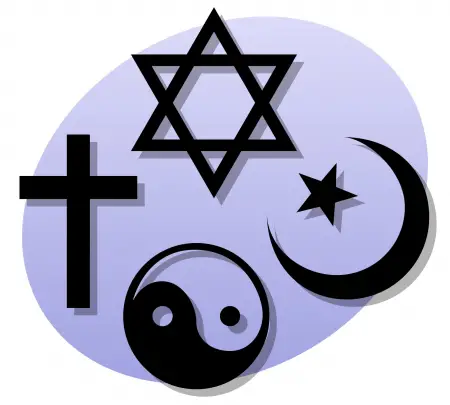A society is characterized by its culture and by its religious beliefs. Sometimes, beliefs within these systems intertwine and dictate the same thing. In this case, how do you know if you are acting in accordance with your culture or in accordance with your religion? What is the difference between culture and religion?
Summary Table
| Culture | Religion |
| Defines the sets of beliefs of people living in a certain area | Defines the spiritual beliefs of a group of people |
| Is geographically defined | Is defined by a core belief – a God or a spiritual quest |
| Includes religion | Can be practiced by people in different cultures |
| A person is defined by the culture he was brought up in | A person can live with or without religion |
| Allows the evolution of a group while not straying from the things that give it its identity | Allows individual spiritual revelation |
| Can change in time | Less likely to change in time |
| There are numerous cultures | There are fewer religions |
Definitions

Culture consists of the set of beliefs a group of people hold. It refers to everything from spiritual life, ways to make the best of resources, how to act within the community, what to celebrate, how to cook food, and more. Some actions are dictated by environment alone, such as the resources available to people in a certain geographical area. However, others are dictated by culture, such as how to cook the food available, how to serve it, and what types of food are considered proper for celebrations.
Life within a community is dictated by shared beliefs. Summed up, these beliefs make up that group’s culture.

Religion is a set of beliefs and practices related to one’s spiritual life. Each religion is built around a core belief and it can have one God, several gods or no God at all. Monotheistic religions offer spiritual enlightenment by following the path laid down by the one God and His prophets. Polytheistic religions allow people to choose the God or gods and abide by a general set of rules to all believers. Religions without gods help the individuals seek spiritual enlightenment on their own.
All religions have a set of practices, rules and rituals for veneration followers need to abide by. Non-compliance with religious rules leads to sin and damnation or an obstruction of one’s path to enlightenment.
There are many religions in the world. People are often born into a certain religion but they can also switch from one set of spiritual beliefs to another or to none at all. It is possible for a person to live outside any type of religion as an atheist.
Culture vs Religion
So what is the different between culture and religion?
Culture defines the way in which a large group of people acts. It defines the evolution of the group and its identity in relation to the place they live. Religion defines the spiritual beliefs of the same people and is a part of the local culture.
There are more cultures than there are religions in the world; therefore, some cultures will share a religion. Although the core set of religious beliefs will be the same, practices vary as they are dictated by the local culture.
A person can live without a religion, but it is less possible to live outside of a culture as it shapes individuals from the very beginning of their life. Cultural traits are passed down from parents to children in the simplest of gestures. Even if a person could leave his country and start a new life among people used to different sets of cultural values, that person will eventually have to adopt the cultural values of his hosts. This is necessary to have a better chance at adapting to the new life.
Another significant difference between religion and culture is the potential for change. What do we mean? Religions tend to have teachings that are not changeable over time. These teachings may have been set down thousands of years ago and may not have changed from that time to now. These rules are usually set down in the holy writings of each religion.
On the other hand, culture is changeable. As a specific society progresses over time, people adapt to new and different ideas, technologies, environmental & economic changes, political changes, and more. Over time, these changes become part of the people and society within that culture.
While religions are usually based on rules and sacred writings, culture is tied to many things, including geographic location, religion, ethnicity, language, architecture, eating habits, traditions, and more. Language allows the knowledge of culture to be passed from one person to another and from one generation to the next. Through language, it’s possible to transmit the culture’s symbols (and their meanings), norms, preferences, and other nuances.
Culture holds the collective knowledge of the people who live in a particular society. With cultural knowledge, it’s possible to determine why people behave and dress in certain ways.
Another difference between culture and religion is that the traditions and knowledge of a culture are usually not written down. On the other hand, religions usually have sacred texts written hundreds and thousands of years in the past.
As you can see, religion is a part of culture, but not the same as culture. Culture is the collective knowledge of a particular society of people who usually speak the same language, dress in similar ways, and more.
Overall, culture adapts to change and allows a community to evolve while remaining true to its identity. Religion is less flexible and less open to change.





